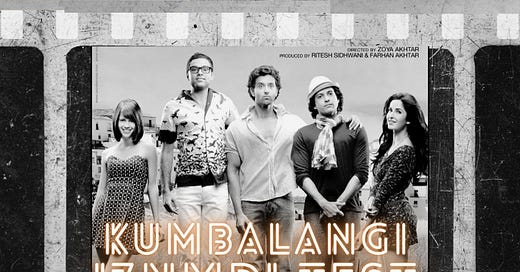The decade or so since it released in 2011 has been kind to Zindagi Na Milegi Dobara (ZNMD). In this period, the wokeness revolution has come and gone been weaponised as a term of disparagement, but ZNMD continues to be relevant, specifically in terms of the masculinity it evokes.
Barring three things in the film, i.e.,
the slight villaini-sation of Kalki Koechlin’s character,
the celebration of an environmentally questionable La Tomatina
and the equally questionable running of the bulls,
the film has weathered really well.
When I saw the film recently for the second time, I quickly lost count of the number of times ZNMD passes the Kumbalangi Test.
The test, which I proposed recently, asks if a male character in a film,
A) talks to another person
B) about any vulnerability
C) other than anger (that comes from entitlement or victimhood).
We’ll come to why ZNMD is so good, but if you prefer, here’s a 58-second video I made on it. You can watch it below or on Instagram.
In the film, Imran (Farhan Akhtar), Arjun (Hrithik Roshan), and Kabir (Abhay Deol) are the best of friends reconnecting after a long time. Kabir has been engaged to marry Natasha (Kalki Koechlin), and the trio decide to celebrate the end of his bachelorhood with a road trip through Spain.
They also decide to honour an old pact, according to which each of them will choose a challenge the others will have to complete.
Deol’s character Kabir chooses underwater sea diving. Hrithik who plays Arjun doesn’t know how to swim and is understandably terrified of the sea.
Arjun himself chooses sky-diving but Imran (Farhan) is terrified of it.
Finally, Imran chooses running with the bulls, which all three know is dangerous and foolish.
These are three external challenges, but far more importantly, each of them is forced to confront an internal challenge.
For Kabir, it is whether he should go ahead and marry Natasha. For Imran, it is whether he should meet and confront his biological father Salman (played by Naseerudding Shah), and for Arjun, it is whether he should let go his corporate, money-spinning persona and just be (with or without Laila, played by Katrina Kaif).
Confronting each of these internal challenges will eventually set them free.
There’s also some friction between Arjun and Imran, the latter having stolen his girlfriend in the past. Shortly after the beginning, Imran says to him, “thank you. Is trip mein aane ke liya. It means a lot to me.” (Thank you for coming on this trip. It means a lot to me.) Imran is being vulnerable, but Arjun isn’t yet ready to forgive yet. We learn why a few minutes later in another scene.
Imran: Shit happens.
Arjun: Yeah. It was shit. For me. And I’m sure tu ne ek second keliye bhi aisa nahi socha hoga. Imran man, main tere saat kabhi nahi karta. (I’m sure you never thought that even for a second. Imran man, I would have never done this to you.)
Imran is exasperated. He says he’s apologised four times.
Imran: Ho gayi galati. Main kya karoon? Kya karoon? Sorry Arjun ka T-shirt pehenke ghooma karu? What should I do?!! (A mistake was made. What should I do? Wear a T-shirt with ‘sorry Arjun’ on it and roam around?)
Arjun: Look at him ya.
Kabir intervenes. A few seconds later Imran speaks again.
Imran: Aur kitni baar sorry kehna padega? How many times, clear hojaye please? (How many more times should I say sorry. Can we clear that up please?)
Arjun leans into Imran and gestures at his own chest: Jab tak yaha se na nikle na… tab tak. (Until an apology comes out of your heart.)
This is important because Imran will later use Arjun’s line on his father.
Few things can be more rewarding for a man than his friendships with other men. They can be fun but also nourishing. Yet we see countless films focus only on the fun aspect.
ZNMD in a sense has the same sense of fun and outrage in its storyline as Hangover (2009), but unlike that film, it has the kind of courage that can only come from vulnerability. We see the trio having lots of fun, making stupid jokes, and creating juvenile pranks, but we also see them being brave, caring, and vulnerable with each other.
(I should say here that I enjoyed Hangover immensely when it came out, but its repeat value plunges to zero pretty quickly (YMMV). It wasn’t as rewarding as ZNMD, which one can watch countlessly.)
Watching the film on repeat, I was aware of an ache inside me, and a deep urge to reconnect with all my old friends. I told myself, it’s not too late, and made a promise to myself that I will try and find a trip like that with each of them in my lifetime.
I counted no less than 9 scenes in which the boys of ZNMD are vulnerable. It does so well in the Kumbalangi Test that there’s a part of me that wants to call it the Kumbalangi ZNMD Test.
What do you think?
Note: In my next post, which I’ve provisionally titled, ‘Gandhi the Muslim’, I try to look at a vexing question around misinformation with a fresh perspective. Do keep a lookout for it.





Yes, I’m all for calling it the Kumbalangi ZNMD Test! 😊